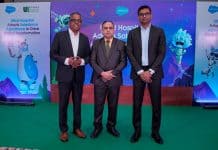By Sachin Nigam, CTO & Co-Founder of Goavega Software India
Even as an increasing number of businesses now become more receptive to adopting digital practices, customisation and cost effective solutions remain high on their priority, when looking for smart solutions. With the pandemic and the looming fear of the third wave in the air, innovative solutions that can help achieve not only the short term goals but also long term disruptive transformations, are the need of the hour. As work from home slowly becomes a norm, product development needs to be focussed on creating value, affordability, operational efficiency, a secure ecosystem that accommodates remote working, and long term sustainability for businesses. Here are 5 key technology trends that every software developer needs to be aware about:
1. Cloud computing and security: While cloud computing has been around for a while now, its true potential and benefits have only now become widely accepted, thanks to the urgent need of making remote workspaces accessible and secure. Over the past few years, Cloud computing has become one of the integral part of digital transformation, allowing businesses to leverage secure and remote data storage, computing power and numerous other cloud services. Further, adoption of Cloud computing technology has allowed companies attain seamless business operations beyond geographical boundaries. However, this has also enhanced the focus on the need for effective cloud security and data storage, which have become vital for maintaining the integrity of a modern business tech infrastructure.
2. Containerisation: One of the most significant tech innovations of today, containerisation is the key for ensuring data security and privacy, even when accessed on private devices. Simply speaking, containerisation technologies are all about allowing business and personal apps and data to safely stay segregated, on a single device. By establishing separate, encrypted containers on personal devices, business data is insulated from everything else on the device and allows the admin to manage only what is in the container, restricting corporate access on personal data, and vice versa. Further, containerization allows multiple applications to be ‘written once and run anywhere’ which in turn, ensures faster development processes, prevents cloud vendor lock-in, and helps in fault isolation, ease of management, simplified security and more. In the age where work is as remote and accessed through private or open public wiFi and unsecured devices, far away from the security and control of a corporate environment, businesses are increasingly turning to containerisation to ensure all corporate data and interactions are well secured.
3. DevOps: A term coined from the combination of ‘development’ and ‘operations’, DevOps is much more than a technology and refers to creating an environment where the entire software development cycle is well supported. It denotes the collaboration of the IT operations and product/ app development efforts, in such a way that there is a complete alignment of software expectation with the stakeholders, and the end product perfectly meets client requirements, can be implemented almost immediately, and results in a satisfactory first trial. DevOps approach to creating customised and agile ecosystems, through the collaborative approach, is crucial during these times, mainly because it offers efficiency, speed, optimisation of resources, and customisation, in a secure environment and can be easily modified or replicated.
4. AI, ML: Artificial Intelligence (AI) and Machine Learning (ML) are probably two of the fastest emerging technology trends that have found widespread application, in a short while. Today, AI and ML have found application across sectors like healthcare technology, BFSI and Fintech, Personal entertainment, driverless cars, robotics and automation in manufacturing and logistics as well as in home and lifestyle automation through virtual assistance and IoT devices. With such a vast spectrum of application, the future of software development is almost incomplete without the adequate knowledge and application of these technologies.
5. Cyber security: Data security and privacy is one of the most crucial aspect when it comes to digital adoption across business processes and has come under focus especially since the start of the global pandemic in 2020. With the increased instances of data breaches, malware and ransomware episodes, the digital ecosystem, with e-commerce, fintech, health tech and almost every business operation across sectors, is vulnerable without an equally robust cyber security ecosystem. Even as the technology adoption and innovations continue to disrupt and shape the future of business and economy, impacting ultimately the lifestyle and support environment for billions, without a strong cyber security network, the digital space is almost bordering dangerous!
Way Forward: Even as we witness and accelerated adoption of technology among both, businesses and individuals, there is also a rising demand for creating an efficient and secure common framework that will not only secure the data but the devices with different use cases too. As digital disruptions become the norm, in this age of the global pandemic, innovations that carry the potential of solving some of the pressing challenges, and create impactful results, are becoming the need of the hour. In other words, one of the key requirements for any successful tech innovation is the product/ service – market fit, which can be achieved by leveraging the above tope technology trends in product development that can become instrumental in strengthening the foundations for further development.














